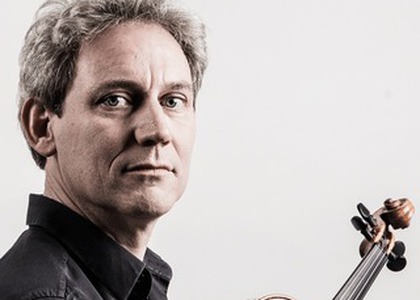> Interviews

Interview with violinist David Grimal
On Wednesday June 5th, a full Mozart concert will take place at the Sala Radio: violinist David Grimal will perform with the Radio Chamber Orchestra as soloist and conductor, and the musicians will offer the audience Concertos Nos. 3, 4 and 5 of Wolfgang Amadeus Mozart's works.
First and foremost, how have the rehearsals been so far?
It's the first rehearsal, the first morning, it's very pleasant. We're getting to know each other better, and it's getting easier. We are more confident.
How do you see these three Mozart Concertos? Should they be united as a whole? How do they differ and what makes them suitable for a whole concert?
They are, in a way, a whole because he wrote them in a short period of time, in just two years he wrote all five concertos, and the last three are almost consecutive. Although they differ in character and fantasy, they belong together and make sense in a concert, because Mozart is a genius, and his music is so exhilarating and full of life and imagination that it is a delight to play them. As a result of the way we play them, we will all be conductors at the end of the concert, because we all know the whole score. Personally, I always try to look at the moon, not the finger pointing at it.
What makes Mozart special in your personal opinion?
First and foremost, he's a genius. His childhood was destroyed by his father, and the rest of his life was destroyed by human stupidity. Yet he laughs in front of the world and at the same time cries like a child and... he has a way of moving us, because he is so human, he is so close to us, in a way. Childhood sacrifice is not something unique, there are many musicians who have had their childhood destroyed by their parents, but he is probably the very epitome of that. He wasn't allowed to be a child; therefore, he remained a child at heart his entire life. That's what's so special about him, he's so deeply profound at the same time, but only children can be that profound, only children can have true feelings that they don't hide, they don't have survival tactics... he's alive, in the fullest, and I think we need him, we ought to perform his music a lot more in these times.
Do you feel as if we've somehow grown away from Mozart?
We've pretty much ruined him with the big orchestras who have played Mozart very romantically. I do think we lost him for a while, I think the industrial period was not so good for him. We lost the finesse and the joy of his music. Perhaps we couldn't look it in the eyes, we lost the way to do it, we didn't understand it, we didn't use the right pencils, we didn't paint it the way it should have been painted, I think. However, at the end of the day, he's just a human who is more human than all humans, and that's the one thing we have to connect to.
Translated by Andreea Georgiana Bogdan,
University of Bucharest, Faculty of Foreign Languages and Literatures, MTTLC, year I
Corrected by Silvia Petrescu














